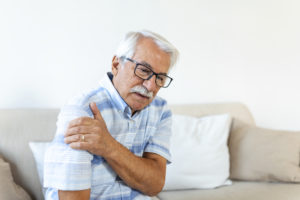Joint pains are a general symptom that may be indicative of a variety of health conditions like arthritis, injury, or infection. Joint pain can affect any joint in the body. Mostly it is felt in the hips, knees, and hands. Symptoms of joint pains can include stiffness, swelling, and difficulty moving the affected joint. There are many joint pain doctors in Zirakpur. Dr Jyotiraditya has been treating patients with joint pains with ayurvedic methods.

How do joint pains occur?
Joint pain can occur for a variety of reasons. Some common causes include:
- Arthritis: Arthritis is a group of health conditions that results in inflammation in the joints, progressing to pain, stiffness, and difficulty in mobility. The most common types of arthritis are osteoarthritis, Gout and rheumatoid arthritis.
- Injury: Joint pain can be an outcome of an injury like a sprained ankle or a torn ligament.
- Infection: Joints may get infected by bacteria and viruses, causing pains, redness and swellings.
- Overuse: Repetitive movements or excessive strain on the same joint can cause inflammation leading to pain.
- Bursitis and tendonitis: Bursitis and tendonitis are the conditions that result from inflammation of the bursa (a fluid-filled sac that cushions the joint) and tendons (the tissue that connects muscle to bone).
- Gout: A gout is a form of arthritis caused by the build-up of uric acid crystals in the joints. This build-up may cause sudden, severe pricking pain and inflammation in the joint.
- Osteoarthritis: Osteoarthritis is a degenerative change in the joint that causes pain and inflammation due to the rubbing of joints with each other.
- Rheumatoid arthritis: Rheumatoid arthritis is an autoimmune disorder that causes inflammation and may damage the joint permanently.
Joint pains presentation
The presentation of joint pain can vary depending on the underlying cause of the pain. However, some common symptoms include:
- Pain: The pain intensity may range from a dull ache to a sharp, burning and pricking sensation. The pain may be constant or intermittent and may become worse with movement.
- Stiffness: Joints may become stiff with restricted movements, particularly in the morning or after prolonged periods of inactivity.
- Swelling: The joint may appear swollen and red.
- Warmth to the touch: The joint may feel warmer. It is due to increased blood flow caused by inflammation.
- Reduced mobility: The joint may not move as swiftly as far as it used to.
- Weakness: In comparison, the joint may feel weaker, especially the weight-bearing joints.
- Cracking or popping sounds: Some cracking and popping sounds might occur while moving the joint.
- Fatigue: Some people may feel tired or have a general feeling of being unwell.
How are joint pains treated in Ayurveda?
Joint pain is called “Sandhishool” in ayurvedic terminology. According to the ayurvedic concept, these pains occur due to an imbalance of the Vata dosha (one of the three doshas that govern the body’s physiological functions). The treatment for joint pain in Ayurveda typically involves a combination of ayurvedic medicines, diet and lifestyle modifications, and panchkarma therapies.
- Ayurvedic medicines: Ayurvedic doctors or vaidyas may prescribe ayurvedic or herbal supplements, such as shallaki, curcumin, hathjod, and guggal, which have anti-inflammatory properties. Dr Jyotiraditya is an ayurvedic joint pain doctor in zirakpur.
- Diet and lifestyle changes: Ayurveda emphasizes the importance of maintaining a healthy diet and lifestyle to balance the three doshas.
- Practitioners may advise avoiding foods that aggravate the Vata dosha, such as cold, stale or raw foods and drinking cold water.
- Ayurvedic Massage therapy: Ayurvedic massage, known as Abhyanga, uses warm ayurvedic oils to massage the joints and muscles. These massages help to increase blood circulation, relax the muscles, and reduce inflammation.
- Yoga and meditation: Certain yoga postures and meditation practices can help to improve flexibility and reduce stress, which can help to alleviate joint pain.
- Panchakarma: Panchkarma is a set of Ayurvedic purification procedures that brings detoxification the body and balance the doshas. Dr Jyotiraditya is a joint pain doctor in Zirakpur who performs panchkarma therapies.
FAQ's
Are joint pains permanent or temporary?
Joint pain can be both permanent and temporary. The duration of pain depends on the underlying cause. For example, joint pain caused by osteoarthritis or rheumatoid arthritis can be a permanent one. On the other hand, joint pain caused by injury, such as a sprained ankle, can be temporary.
Can Ayurveda treat inflammations?
Yes, Ayurveda treatments have good results in reducing pain and inflammation. Various herbs and ayurvedic medicines have miraculous effects in reducing pain and inflammation.
Dr. Jyotiraditya Agarwal

Contact Us
Testimonials

Rahul Sharma
CIVIL ENGINEER
I am very satisfied with my back pain problem that is almost 100 % resolved by treatment done at Nidanam. My problem was almost 8 years old. I had consulted so many doctors but in vain… then came to know about this clinic and now my back pain is History.


Aditi Bose
DESIGNER
I am extremely happy with my Hair Treatment done by Dr. Bhavana. I was almost on the verge of getting bald. I started my Hair treatment at Nidanam and it took me 6 months to find my scalp full of hairs back. I am Very very happy with the results.


Pulkit Rastogi
CUSTOMER
I lost almost 27 Kg here at Nidanam. They don’t make you starve nor make you exercise hard. With their specialized diet plans along with weigh loss techniques I was able to shed off those Kgs..
